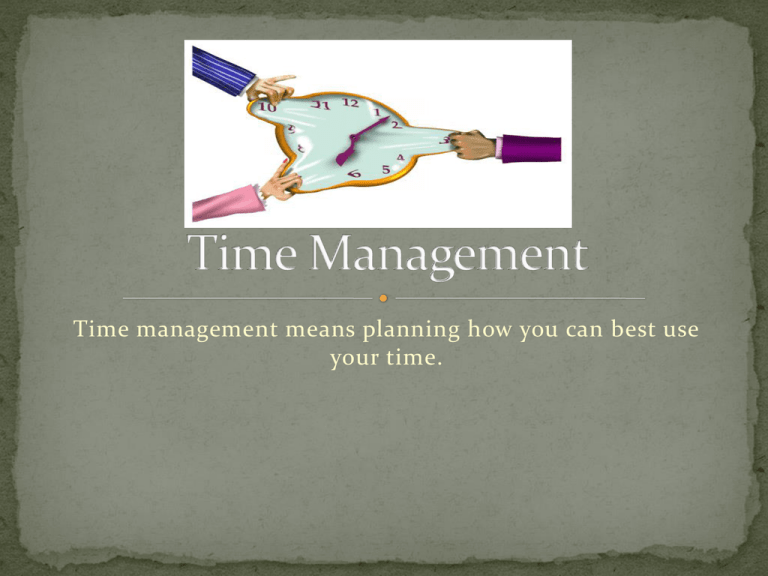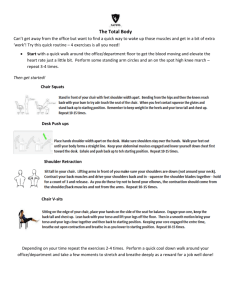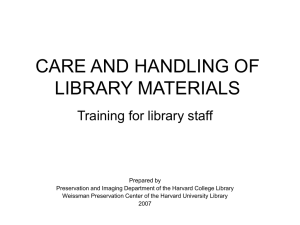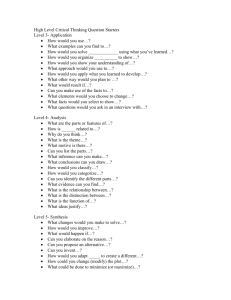Time Management
advertisement

Time management means planning how you can best use your time. You will not be an expert right away; it is a continuous, lifelong process of discovery, experimentation and reflection! Time is what we want most, but what we use worst. - William Penn http://www.youtube.com/watch?v=9aK_IiVBYW0 To escape an unpleasant task To get someone else to do the job To gain sympathy for an overwhelming assignment To avoid change Over-commitment – we don’t know where to start Action Type: Tend to concentrate on the present and what needs to be done. Have a good grasp of time and how much will be needed to do something. May have problems with: Unexpected change Crisis situations Being stalled by outside circumstances Not having time to plan Idea Type Have lots of ideas and suggestions, but not as interested in how they actually get accomplished. Often have a good sense of time but may underestimate how long it will take to do something. May have issues with: Lack of follow-through Missed deadlines No internal clock, no sense of time passing Boredom with routine or dull tasks Logic Type: See the whole picture. Generally great planners and good at organizing tasks into time sequence May have issues with: Having to make quick judgments Making a decision without enough information Having to rush to produce something You probably noticed that one or more seem to fit your style. Knowing your type and having an understanding of all types will help you understand why some people around you have such different ways of managing their time. Deal with tasks as they arise - prioritize and delegate Eliminate “wasted time” Keep interruptions to a minimum Keep your door closed when you need to concentrate Don’t always be available. It’s ok to say NO. Win the paper chase. 1. Don’t keep anything unless you are certain you are going to need it later and no one else has it. 2. The first time you touch a piece of paper, do something with it. Ask for time to think about it Don’t give excuses Refuse with tact Don’t procrastinate – make a completion date and stick with it. Limit the number of times a day you check your email. Make printouts only of emails that require it. Use personalized form responses. Remember that you don’t have to respond to every message Clear your inbox of all messages regularly. Consider whether email is the most effective way to deliver you message. The only reason for time is so that everything doesn't happen at once. - Albert Einstein The time you spend waiting to go to meetings, waiting for appointments, standing in line or stalled in traffic can be used to your benefit. Keep a list of small tasks that have to be done Give yourself a break – relax, stretch, get up and walk around Use a to do list Get set in your ways Break it up – divide large tasks into small ones (get a better sense of accomplishment!) Pick up good habits Big messes start with little piles – finish your tasks Start for tomorrow tonight Don’t forget….write yourself a note First things first – prioritize your tasks Learn to say NO! Be flexible – effective time management will take some time to get used to. No matter what you did or didn't get done today, there is always tomorrow! Create an activity log Keep your desk clear of all but current projects and the items you use on a daily basis Clean out your files, shelves and drawers regularly. Create a monthly and daily tickler file Do quick tasks immediately Return items to their place when done using them Keep workspace supplied with the things you need to do you job Use your free time wisely. When on hold on the phone, sort the papers on your desk or make your grocery list Do a quick pickup each night before bed or leaving work. Stick to a healthy diet Stay away from too much caffeine Build time for relaxation Take short breaks, stretch, get some fresh air Seek support Work together with everyone in your household Share chores and responsibilities Cut down on other commitments during a work crunch Don’t be afraid to ask for help Get organized at home – sell, donate, throw away what you don’t use When opening your mail – toss junk mail and old newspapers in the recycle bin Plan meals for a week or two – make a complete list for grocery shopping Cook double batches Pack lunches and lay out clothes the night before Keep your workspace supplied with the thing you need to do your job Clean out files and draws Keep a single calendar at home Cut back on commitments Look at your daily routines and what changes you could make to save time





